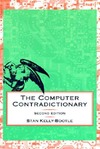[The Computer Contradictionary] is ultimately a manual to our industry, computer history, and much of your universe as it really ought to be. It is also the first dictionary you're likely to read in one sitting. Enjoy! — Andrew Binstock, UNIX Review ''With his mind-numbing grasp of English, literature, computer history, and programmer culture, Stan is the Umberto Eco of programming.'' — Ron Burk, Windows Developer's Journal
''Ascertain the meaning before consulting this dictionary,'' warns the author of this collection of deliberately satirical misdefinitions.
New computer cultures and their jargons have burgeoned since this book's progenitor, The Devil's DP Dictionary, was published in 1981. This updated version of Stan Kelly-Bootle's romp through the data processing ''laxicon'' is a response to the ''Unix pandemic'' that has swept academia and government, to the endlessly hyped panaceas offered to the MIS, and to the PC explosion that has brought computer terminology to a ''hugely bewildered, lay audience.''
The original dictionary, an urbane and witty pastiche of Ambrose Bierce's famous work, parried chiefly the mainframe and mini-folklore of the 1950s, 1960s, and 1970s. This long-awaited revision adds over 550 new entries and enhances many of the original definitions. Key targets are ''a host of new follies crying out for cynical lexicography [including] the GUI-Phooey iconoclasts, object orienteering, and the piping of BLObs down the Clinton-Gore InfoPike.''
ack n. [Origin: back-formed negation of nak.] A signal indicating that the error-detection circuits have failed.
computer science n. [Origin: possibly Prof. P. B. Fellgett's rhetorical question, ''Is computer science?''] A study akin to numerology and astrology, but lacking the precision of the former and the success of the latter.
multimedia n. An application attacking all five senses of the user — sight, hearing, smell, taste, and touch — but especially, smell.
 |
|
О проекте
|
|
О проекте


